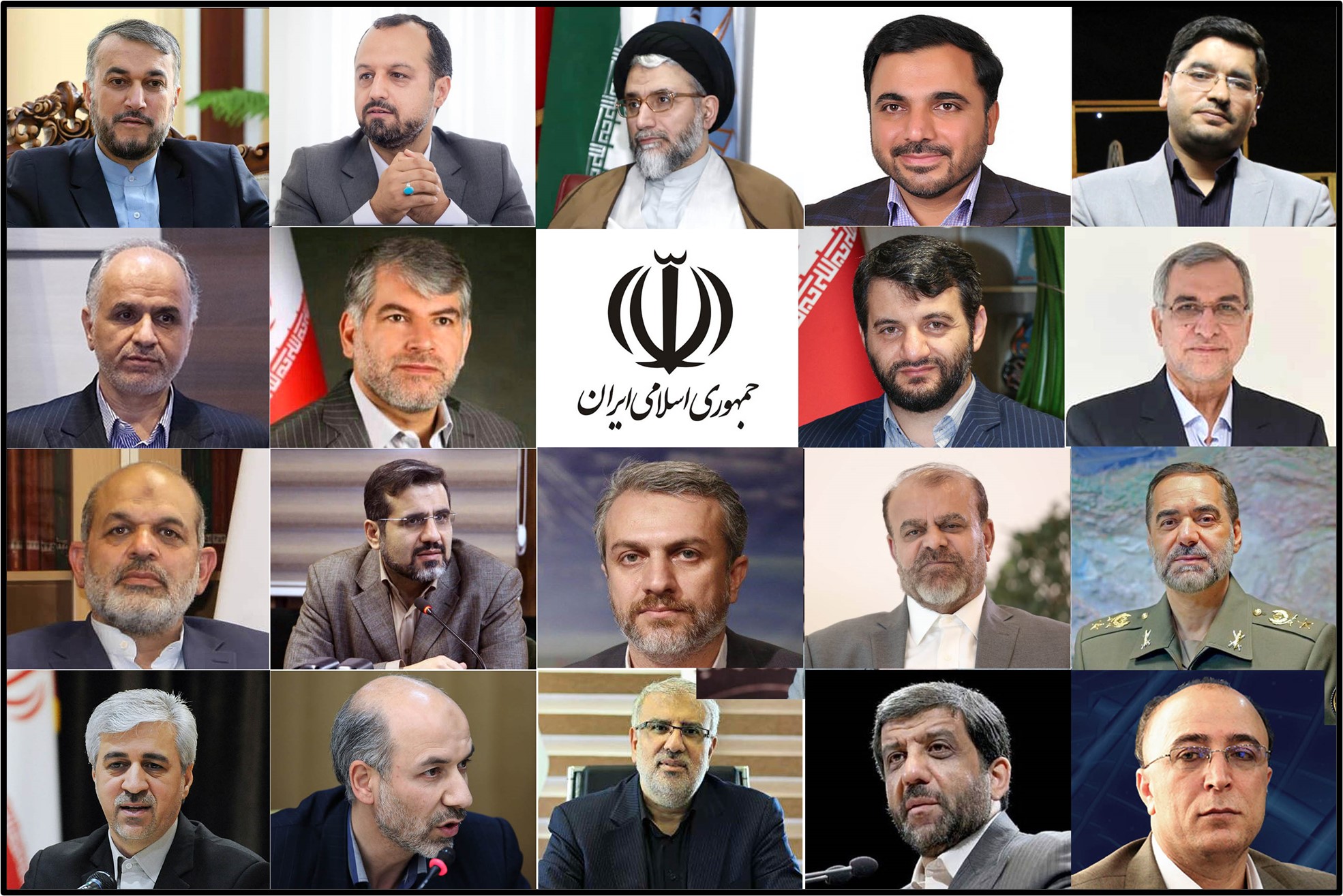
On Aug. 11, 2021, President Ebrahim Raisi submitted a list of 19 proposed cabinet members to Parliament, the Majles, which must approve all nominations. Two weeks later, Parliament approved all of his picks with the exception of his proposed education minister. Raisi’s new cabinet includes five ministers who are designated under U.S. sanctions. Raisi, his chief of staff Gholamhossein Esmaili, and his first vice president Mohammad Mokhber have also been sanctioned by the U.S. Treasury. Four members of the cabinet were members of the Revolutionary Guards (IRGC), with three holding the rank of brigadier general.
Raisi was tasked by Supreme Leader Ayatollah Ali Khamenei and the Iranian media to form a younger cabinet. The average age of his all-male nominees is 52. The average age in Rouhani's cabinet was 59 in the first term and 57 in the second term. Supreme Leader Khamenei has recently urged the inclusion of younger officials, notable since the first generation of revolutionaries is aging or dead. The new cabinet includes 16 with doctorates, mostly from Iranian universities, in contrast to Rouhani’s cabinet, which included several who had lived in or been educated in the West.
Raisi has little experience in foreign policy and national security issues and provided little insight about concrete plans, including on key questions such as Iran's approach to the nuclear negotiations with the world’s six major powers in Vienna. Over the past four decades, the mid-ranking cleric has focused largely on domestic, religious, or judicial issues. So his cabinet ministers may shed light on some of his future policies on national security matters.
Hossein Amir-Abdollahian
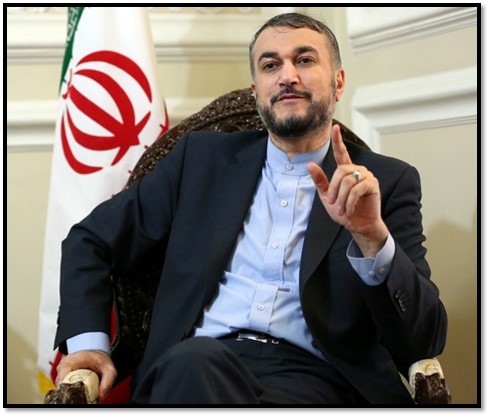
Hossein Amir-Abdollahian was confirmed as foreign minister, replacing Mohammad Javad Zarif. Amir-Abdollahian recently served as the senior advisor for international affairs for the speaker of the Majles under Ali Larijani and, since 2020, under Mohammad Baqer Qalibaf. For most of his career, he worked in the foreign ministry, where he focused mainly on Iran's neighbors in the Persian Gulf. He reportedly has close ties with the IRGC and other key figures in the so-called axis of resistance. Amir-Abdollahian was famously photographed kissing the forehead of General Qassem Soleimani, the Qods Force commander who was killed in a U.S. airstrike in January 2020.
Born in 1964 in Damghan, some 200 miles east of Tehran, Amir-Abdollahian’s first posting was in 1997 to the Iranian embassy in Iraq. He later served as the head of the foreign ministry's special department for Iraq. He led Iran's delegation to the 2007 talks, in Baghdad, with the United States on Iraq’s security situation. Amir-Abdollahian rose through the ranks of the diplomatic corps to serve as ambassador to Bahrain from 2007 to 2010 and as deputy foreign minister for Arab and African affairs from 2011 to 2016. He holds a PhD in International Relations from the University of Tehran. He is fluent in Arabic and English. The following are key quotes from Amir-Abdollahian on key foreign policy issues.
On Raisi’s foreign policy:
- "The foreign policy of the next administration of Iran will be dynamic and logical with a strong discourse that can serve Iran's interests in all areas.” (July 2021)
- "The priorities of the foreign policy will be active and dynamic relations with the East and West of the world with special attention to all neighbors and Asia." (July 2021)
- "As the Leader of the Islamic Revolution reiterated, in our foreign policy we should prefer the East to the West and neighboring countries over distant countries in order to safeguard the national interests of our country. Establishing relations with the countries which have common interests with us is preferable to relations with those whose interests might even clash with ours.” (February 2021)
- "The 21st century is the century of Asia. The Islamic Republic has always paid attention to Asia. There are many important and still untapped capacities in Asian countries such as Russia, China, India, Malaysia, Indonesia and subcontinental countries and, as a result, we could exploit them due to our common interests with countries in Asia." (February 2021)
- "Every decision made in the White House will not change, in any way, the Islamic Republic’s outlook towards the preservation, reinforcement and development of Tehran’s strategic relations with Moscow and Peking and its long-term outlook towards Asia." (February 2021)
On the U.S. and the JCPOA nuclear negotiations:
- “Biden wants to return to the nuclear deal and should not include regional or missile issues in the JCPOA but should focus on the deal and commit to return to the JCPOA.” (July 2021)
- “The three European countries [Britain, France and Germany] must apologize to the Iranian people for not playing any effective deterrent role in the face of unilateral US sanctions and its withdrawal from the JCPOA. They just said useless words and showed the true nature of a weak Europe in the contemporary world… There is no difference between the behavior of Europe and the United States, and some European countries are the main agents of the United States.” (June 2021)
- "Iran moves forward its peaceful nuclear program & stresses on lifting sanctions effectively, verifiably. If not honoring Iranians' rights, they must await Tehran's decisive decision." (June 2021, Twitter)
- "To realize the lifting of US 'max sanctions' against #Iran, we need to stick to 'max demands' in the negotiations. This logical approach will be fruitful against the US, E3 contradictory behaviors. America's constant infringement of its commitments has led to increasing mistrust." (April 2021, Twitter)
On Russia:
- “The Russians have had good experiences alongside the Islamic Republic as a result of their outlook towards global developments and towards Iran as an outstanding regional power… Putin’s Russia is not the same as the Soviet Union and the eastern communist bloc. Putin’s Russia is also different from pre-Putin Russia. We will certainly benefit from developing and strengthening our cooperation with countries such as Russia.” (February 2021)
- “Paying attention to the positive experience between Iran and Russia during their cooperation in Syria, despite the U.S. opposition, shows that more cooperation experiences can be witnessed between Iran and Russia in the future.” (February 2021)
On regional issues:
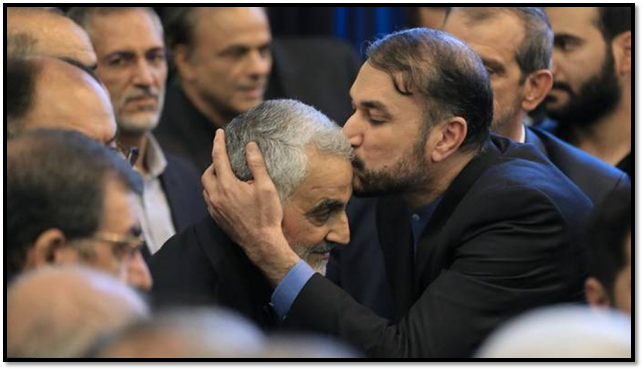
- "The Saudi King, invading Yemen & aiding the DAESH's American terrorism in Iraq, Syria, Lebanon & Yemen, has no right to accuse Iran. It's better for Riyadh to stop serving Israel & respect the neighbors. #Iran has always been advocate of the neighbors' & region's peace/security. (November 2020, Twitter)
- "Bahraini regime's compromise w/ #Israel is a great betrayal to the Islamic cause & Palestinians. The imprudent leaders in UAE, #Bahrain must not pave the way for the Zionist schemes. They should learn lessons from history. Tomorrow is late! The US lifeline has worn out for years." (September 2020, Twitter)
- "Bashar al-Assad is the legitimate president of Syria and the great leader of the fight against Takfiri terrorism in the Arab world… Tehran strongly supports the sovereignty, national unity and territorial integrity of Syria." (May 2020)
On the Revolutionary Guards:
- "The role of Martyr Hajj Qassem Soleimani in ensuring maximum security for the region is undeniable." (February 2021)
- “The outstanding achievements of the Quds Force of the IRGC and its former commander Lieutenant General Qassem Soleimani have brought security to Iran and the region.” (January 2021)
Mohammad Reza Ashtiani
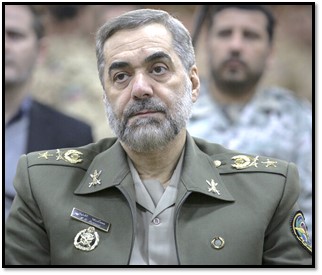
Brigadier General Mohammad Reza Ashtiani was confirmed as defense minister, replacing Amir Hatami. He served most of his career in the Iranian Army — or Artesh, the conventional wing of Iran’s multi-faceted military, as did his predecessor. He recently served as the deputy chief of the Armed Forces — under Major General Mohammad Bagheri. In 2020, he was sanctioned by the U.S. Treasury under Executive Order 13876 for advancing "the regime's destabilizing objectives" and being appointed as a state official of Iran by the Supreme Leader.
Born in 1960 in Tehran, he entered the Army's officers course as a cadet in 1979. After finishing the course in 1982, he served in the Army’s 23rd special forces division until 1984, when he was commissioned to train cadets at Imam Ali University. He later served as deputy commander of the Artesh ground forces, deputy chief of the Artesh, and other positions within the top echelons of the regular Army. Ashtiani holds a PhD in defense management from the Supreme National Defense University. The following are key quotes on Iran’s military strategy and priorities.
On Iran’s strategic posture:
- “Today, the power of the Islamic Republic of Iran is accompanied with strength and dignity. We are in the best situation in different dimensions, equipment and superior abilities, and all of this is because of the role of Martyr Soleimani and the regional power of Iran.” (February 2020)
- “We are transforming the army's level of readiness into one of the best and most outstanding armies in the world, and we will respond to any kind of threat and adventure in the most overwhelming way.” (April 2007)
On the United States:
- “America knows Iran’s level of power in the military and defense areas and is aware that any practical threat will result in serious damages. Iran’s geographic position and strength is known to countries and they know that our country is in the peak of its readiness and power.” (April 2007)
- “The missile retaliation of the armed forces [against the Ayn Al Asad Airbase in Iraq in 2020] indeed broke America’s fragile grandeur in the world. The issue of deterrence is very important and fundamental for us. The deterrence helped us so that the enemy will not covet [us].” (January 2020)
On Iran's response to threats:
- “All of our enemies know that the armed forces are ready to resist any threat. [The armed forces] are present in every arena where there are needed and execute their assignments and duties with dignity in the optimal way.” (November 2020)
- "We will surely confront anyone who will desire to damage Islamic Iran or to mischief and make adventures. The aggressor will pay very heavy prices, but so will the world.” (May 2008)
On military doctrine:
- “A continuous and holistic effort to expand the passive defense commensurate with the country’s situation and the leading threats is among our goals. Another policy that we must endeavor [to reach] is achieving combat and technological readiness at the strategic and operational levels with an emphasis on sustainability and core abilities” (January 2020)
- “The future wars will be long-distanced and with reliance on speed and precise fire, and intelligence will also be more important in this field” (April 2007)
- "Our classical army can be transformed into forces and irregular groups" (April 2007)
Hojatoleslam Seyed Esmail Khatib
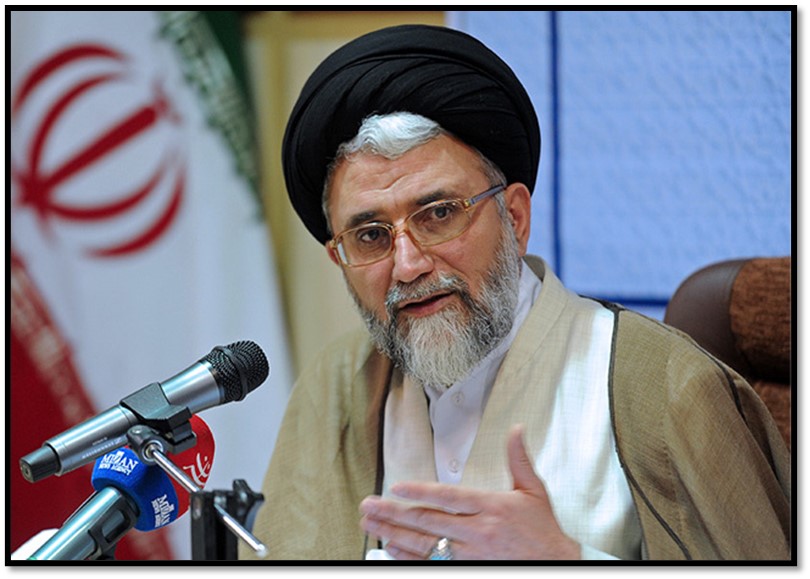
Hojatoleslam Seyed Esmail Khatib was confirmed as intelligence minister, replacing Mahmoud Alavi. He was recently the head of security at the Astan Quds Razavi, one of the county's most prominent and wealthy bonyads, or charity foundations.
Born in 1961, Khatib joined the IRGC intelligence wing in 1980. He later worked in the Ministry of Intelligence and in the office of the Supreme Leader. According to Iranian media, he studied jurisprudence under Supreme Leader Khamenei as well as Grand Ayatollahs Mohammad Fazel Lankarani, Naser Makarem Shirazi and Mojtaba Tehrani. Between 2011 and 2019, Khatib served as the head of the Protection and Intelligence Center in the Judiciary. He was replaced shortly after Raisi was appointed to be the Judiciary chief, a fact which may indicate past tensions between Raisi and Khatib. Khatib may owe his nomination to Khamenei. In past cabinets, the choice of intelligence minister was heavily influenced by the Supreme Leader. The following are key quotes from Khatib on intelligence and security issues.
On Iran's enemies:
- “After the victory of the Islamic Revolution, the enemy was not able to achieve its goal of subversion, therefore it seeks to change [its] behavior by using economic warfare. Today, with the help of the cyberspace, it has promoted, propagated and intensified the psychological war against the [Islamic] religion and the revolution.” (September 2018)
- "The blessings that God has bestowed on us will face threats every day. As Satan swore to create sedition, today his collaborators – Jinns, humans and all of his agents -- will endeavor in this direction.” (August 2018)
- “The seditionists have tried to impose upon this country in different ways such as the imposed war [the Iran-Iraq war], the events of 1388 [the 2009 protests] and past disturbances. The awareness, insight and enlightenment of us all in following the Supreme Leader and the axis of vilayet[-e faqih]is our only way of redemption.” (October 2016)
- “During the 37 years that have passed since the victory of the Islamic Revolution, the enemy has not spent even one night without dreaming of sedition and conspiracy against the Islamic regime.” (January 2016)
On world powers:
- “The world powers cannot force Iran once again to retreat by using orders and coercion. The might and expansion of the Islamic revolution is a result of the readiness, patience, endurance and tolerance of the people.” (July 2018)
- “In the current situation, the Islamic Republic of Iran once again was able to defeat the enemy’s conspiracies [by using its] regional power, [its] scientific achievements, the participation and endurance of the people, the spirit of jihad and martyrdom-seeking of the people.” (September 2018)
Ahmad Vahidi
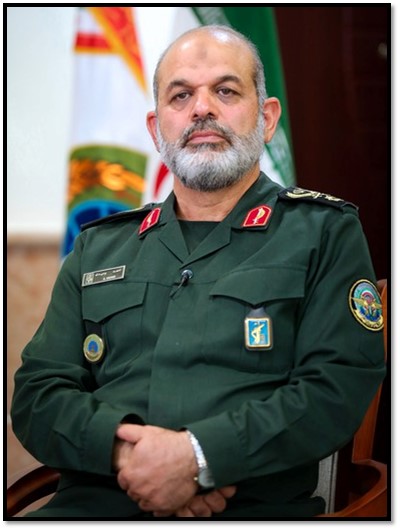
Ahmad Vahidi was confirmed as interior minister, replacing Abdolreza Rahmani Fazli. He recently headed the Supreme National Defense University and was a member of Iran's Expediency Discernment Council. He was sanctioned by the U.S. Treasury in 2010 under Executive Order 13382 for his ties to Iran's nuclear program and development of other weapons of mass destruction when he was deputy defense minister. Vahidi is also listed on an Interpol Red Notice—or international alert for wanted people--since 2007 at the request of Argentina, where he is wanted for alleged involvement in the 1994 bombing of the Jewish AMIA center in Buenos Aires that killed 85 people and injured hundreds.
Born in 1958 in Shiraz, under the name of Ahmad Shah Cheraghi, Vahidi joined the IRGC in 1979 and became deputy IRGC chief for Intelligence during the war with Iraq in the 1980s. He was the first commander of the IRGC Quds Force; he was replaced by General Qassem Soleimani in 1997. Vahidi was appointed to be deputy defense minister under President Mahmoud Ahmadinejad’s first term (2005-2009); and served as defense minister during his second term (2009-2013). Vahidi holds a PhD in strategic management from the Imam Sadegh University. The following are key quotes by Vahidi on security issues.
On Iran's missile program:
- "Negotiations over [Iran’s] defense capabilities is akin to allowing our homeland to become an easy military target for the enemies. Obviously, no one in their right mind would accept it. No country in the world is willing to negotiate over its defense capabilities and, of course, Iran is no exception to this rule." (June 2019)
- "Today, Iran is one of the most powerful countries in the military sector, and the main reason is its pursuit of valuable concepts of martyr and martyrdom. Today, enemies are seeking to restrict the missile power of Iran, but they should be aware that they will never be able to hamper this path." (December 2017)
On negotiations with the United States:
- "Negotiations with the Americans is always a wrong move. Over the past decades it has been proven that whenever the greenlight was given for talks with the United States, it did not yield results, since Washington reneged on its commitments. Therefore, negotiations with the United States, especially with the current [Trump] ruling body of the country, are irrational and impossible." (June 2019)
On Soleimani:
- "Nobody should doubt that the martyr’s [Soleimani’s] approach may abate or subside. We do not look for a war, but we’ll definitely seek to restore [our] rights and take revenge." (January 2020)
Other key nominations
- Ezzatollah Zarghami was nominated to the ministry of tourism and cultural heritage. Born in 1959 in Tehran, Zarghami was a high ranking IRGC officer who later served as deputy culture minister, deputy defense minister and, for a decade, the director of the Islamic Republic of Iran's Broadcasting Service. He was designated by the European Union on 2012 and the U.S Treasury on 2013 under Executive Order 13628 for human rights abuses.
- Rostam Qasemi was nominated to the ministry of roads and urban development. Born in 1964 near Shiraz, Qasemi was an IRGC officer. He chaired the Khatam-al Anbiya Construction Headquarters, the IRGC's engineering arm. He was minister of oil during Ahmadinejad’s second term. According to the S. Treasury, he was later involved in Iranian Petroleum shipping network that supported the IRGC Quds Force. In 2010, he was sanctioned by the European Union and the U.S. Treasury, under Executive Order 13382. He was designated by the United States again in 2019 under Executive Order 13224 for "acting for or on behalf of the IRGC Quds Force and IRGC Quds Force Commander Qassem Soleimani."
Omer Carmi (@CarmiOmer) is a former visiting fellow at The Washington Institute for Near East Policy.
